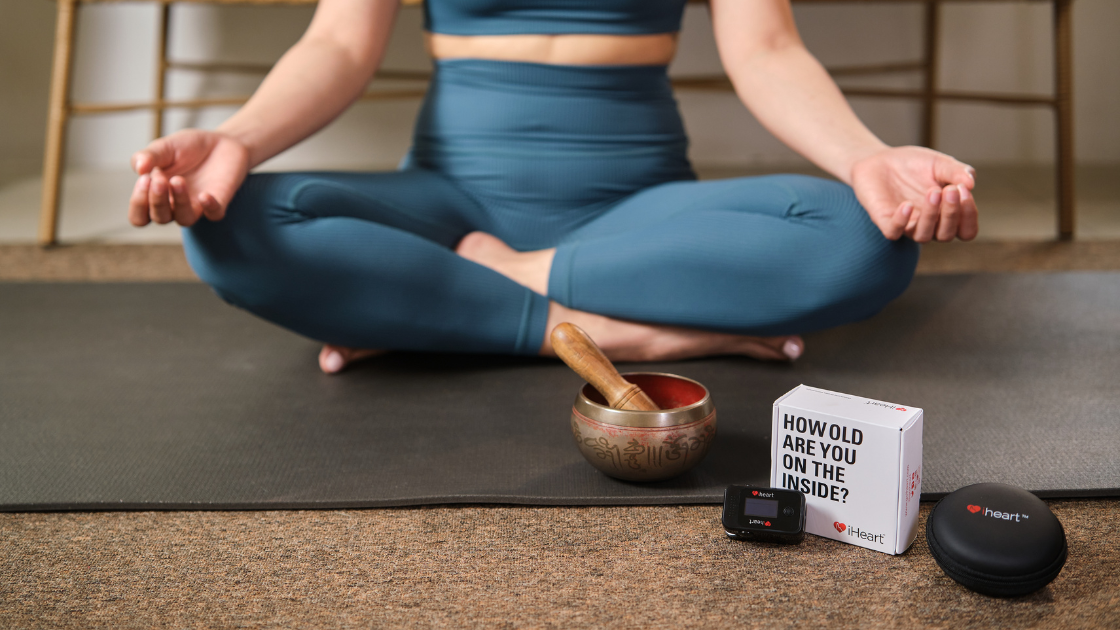Take a moment to check in with yourself: how stressed do you feel right now?
Most of us would agree that our modern lives are becoming increasingly stressful, even on a day-to-day basis. We’re overstimulated, overworked, and overcommitted, and bad news seems to be everywhere we turn. This doesn’t even take into account the more severe, short-term stress we experience when facing life’s challenging situations.
If we allow acute stress to build up in our bodies without finding a healthy way to manage it, it can have serious long-term consequences on our health. The good news is, it doesn’t have to be that way – and there are simple ways to reduce your stress, even as you navigate our hectic modern world.

How Does Stress Affect the Body?
We talk a lot about aortic stiffness at iheart because it’s a fantastic indicator of overall health and longevity. A stiff aorta points to an increased risk of cardiovascular disease and decreased longevity. It can also indicate a higher internal age (how old you are on the inside), because our aortas naturally stiffen as we age. Keeping our aortas flexible and healthy is crucial to whole-body wellness and extending our lives.
While poor diet and lack of exercise are common culprits behind increased aortic stiffness, another crucial factor that can cause aortic stiffness is stress.¹
Thankfully, aortic stiffness can be reversed. Along with a healthy diet and regular exercise, managing stress will help promote the health of your aorta – and all your vital internal structures.
Here are three simple ways to hack your stress levels, no matter what’s going on in your life.

Practice Proper Breathing
Pay attention to how you’re breathing right now. Where do you feel your breath in your body? Is it in your upper chest? Your throat? Your stomach? If your answer was either of the first two options, you might be dealing with a little (or a lot) of stress – or you might be creating stress that doesn’t need to be there.
Deep belly breathing is widely regarded as an excellent way to combat stress and stimulate the body’s parasympathetic nervous system (your body’s “rest and digest” mode). Have you ever observed the way a child breathes? They naturally breathe into their stomachs. However, this changes as we get older and we start breathing more into our upper chests, which only keeps us hanging on to the stress in our bodies.
Regularly practicing proper diaphragmatic breathing will help you deal with stressful situations in the moment and lower your long-term levels of stress. A proper breath looks like this: the inhale starts in the nose and moves to the stomach as your diaphragm contacts, causing the belly to expand and your lungs fill with air.
Try practicing proper breathing for a few minutes each day until it becomes a habit, and notice how you feel after.
Cultivate a Positive Mindset
You’re probably aware that positive thinking is beneficial to your mental health, whether or not it’s something you incorporate into your life. But if you knew that cultivating an optimistic outlook could help lower your internal age and prevent aortic stiffness, would you pay more attention to it?
Choosing to notice the wonderful things about your life and expecting good things to happen is a powerful way to reduce stress. Even just taking five minutes a day to write in a gratitude journal can have notable benefits for your mental (and consequently physical) health.
The moment we latch on to a negative or distressing thought, our bodies feel the impact immediately. Our heart rate picks up, our breathing gets shallower, and we might even feel a rush of adrenaline as our sympathetic nervous system kicks in. But the opposite is also true: thinking positive thoughts has an immediate calming effect on our bodies.
If we cultivate a regular habit of positive thinking, our overall stress will decrease. We’ll find ourselves naturally choosing the optimistic view, and we’ll start to feel better overall.

Enhance your Mind-Body Connection
Do you ever find yourself feeling detached from your body? Maybe anxious thoughts pull you out of the moment and into your head, or you’re so focused on finishing a task that you’re not listening to your body asking you for a rest.
Learning how to “tune in” to both our bodies and minds simultaneously can be a highly effective way to manage stress. For example, someone who has honed their mind-body connection knows to take deep breaths when their thoughts begin to race, because they understand the effect their physical state has on their state. Likewise, they know to think calming thoughts when they feel their breathing get shallow and their heart pound.
The mind doesn’t operate separately from the body, neither the body from the mind. Understanding how the two systems interact and knowing how to work with them can help you reduce your stress and cultivate lasting calm.
One fantastic way to improve your mind-body connection is through biofeedback tools like the iheart HRV app.
Hack Your Stress with iheart HRV
The iheart device and iheart HRV app can show you in real-time how your body responds to both stress and stress-reducing tactics, helping you build a lasting mind-body connection.
The iheart HRV app measures your heart rate variability (HRV), which refers to the variation in time between each heartbeat and is controlled by the autonomic nervous system. Generally, if your nervous system is in fight-or-flight mode, the variation between subsequent heartbeats tends to be lower. If the system is in a more relaxed state, the variation between beats trends higher. You can see what happens to your HRV as you take deep breaths, as you think positive thoughts, and what happens when you do the opposite.
As you check in on your stress and see how your body responds to these mental health-boosting techniques, you might find yourself incorporating these techniques into daily life when you start to feel stressed.
Ready to add years to your life and feel calmer day to day?
Sources






Share:
Protect your Brain: Understanding and Preventing Dementia
How to Get the Most out of the iheart Brain App